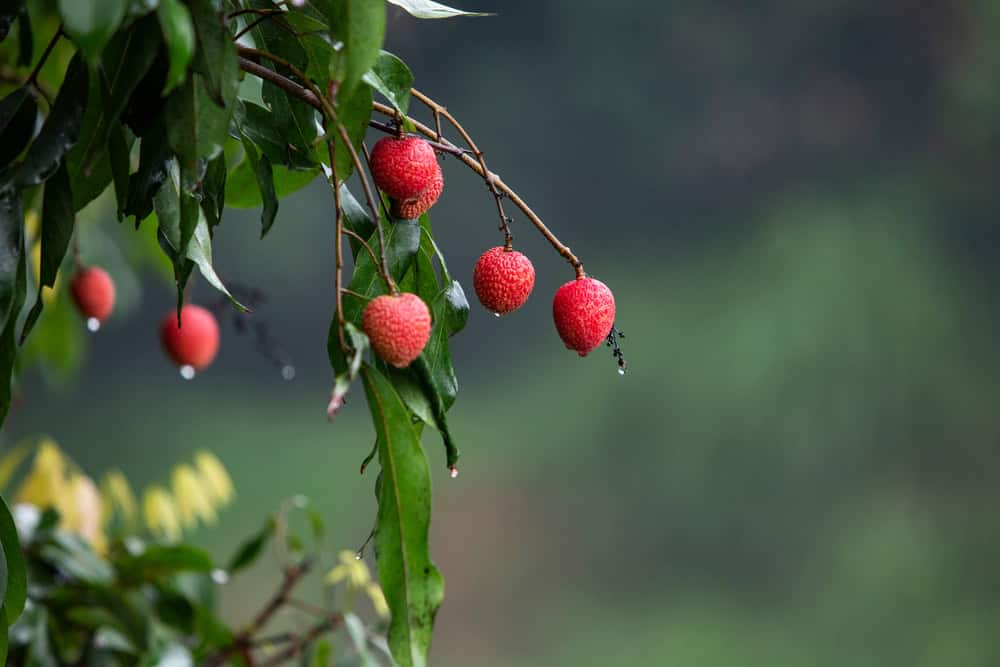
Let’s face it: monsoons can be a tough time to stick to healthy eating habits. In the rain, we are tempted by deep-fried snacks & comfort food. But, what if we told you, there is a juicy & refreshing fruit that can satisfy your cravings & is also good for you? The answer is Lychee.
While typically seen as a seasonal luxury, lychee is most abundant during summer and early monsoon. It can be much more than a sweet treat; it is highly concentrated in antioxidants, Vitamin C, and hydration-enhancing qualities that help make it the ideal fruity delight for the rainy season. One standout lychee benefit is its impressive ability to provide both flavor and functionality in your wellness routine.
So, peel back that thorny exterior; here are 7 science-backed reasons to indulge in lychee this monsoon:
1. Immune-Enhancing Vitamin C Powerhouse

Lychee has exceptional amounts of vitamin C, with 100 g providing 72 mg, which is over 75% of the daily value [1]. Vitamin C is a crucial antioxidant that supports the immune system, especially during the monsoon season when infections are common. Consuming lychee regularly may significantly reduce the chance of getting a cold or serious respiratory disorder. Another strong lychee benefit is its ability to strengthen immunity naturally.
2. Antioxidants & Anti-Inflammatory Agents

The pulp, peel, and seeds of lychee provide a wealth of polyphenols, anthocyanins, and flavanols (like quercetin, cyanidin, and procyanidins) which counter oxidative stress and inflammation [2].In vitro studies indicate that these compounds inhibit pro-inflammatory marker production, such as TNF-α and nitric oxide, beneficial when dealing with joint pain and inflammation [3]. This antioxidant activity is a powerful lychee benefit often overlooked.
3. Aiding Digestion & Gut Health

Lychee has 80% water and 2.5 g fiber per cup, and promotes satiety, hydration, and a normal, gentle movement of the bowels during the wet, damp season. Fiber is also a prebiotic that can boost your good gut bacteria, which are important for digestion, and prevent key bloating or gut issues that can happen during the monsoon. This gut-friendly function is another lychee benefit that’s perfect for rainy days.
4. Heart-Healthy Nutrients

Potassium and fiber in lychee support heart health by regulating blood pressure and improving cholesterol levels. Polyphenols also improve vascular health by reducing oxidative stress and improving blood flow [5]. You can benefit from lychee in a heart-healthy way that’s delicious and nourishing.
5. May Aid Blood Sugar Management

Lychee, though sweet, has some very positive effects on glucose regulation. Fiber and polyphenols slow down sugar absorption and make blood sugar spikes lower in levels. Eating lychee moderately and with meals may help stabilize blood sugar levels. This can support better blood sugar management when eaten wisely.
6. Improves Skin & Hair

Lychee is very high in vitamin C, copper, and antioxidants, and encourages collagen, which promotes skin elasticity and reduces dullness from humidity. Anthocyanins and polyphenols also help guard against premature aging and skin issues that arise from inflammation, especially during a monsoon. Looking for a glow-up? Here’s a lychee benefit that works from the inside out.
How to Enjoy Lychee Safely?

-Eat ripe & fresh: Do not eat unripe lychee or lychee that has been kept in the refrigerator for a few days. They could contain toxic compounds like hypoglycin A, which is known to cause hypoglycemia (which is dangerous for malnourished individuals). Also, check for worms; carefully examine the fruit’s tip to look for any sign of infestation.
-Moderation is important: You can have around 8 – 12 lychees in a day to gain the lychee benefit without overloading on sugar.
-Try new ways to eat lychee: Use lychee in various recipes to enjoy its sweetness. You can add lychee to smoothies and fruit salads, light chaat, or infused water during monsoons.
-Avoid seeds: Be careful while eating since lychee has a slippery texture and the seeds might get swallowed and stuck in the throat, especially in small kids. Also, if you eat lychee seeds, there could be harmful effects. The seeds contain high amounts of hypoglycemic glycine.
-Talk to your doctor: If you are a diabetic person or have issues controlling blood sugar, it is better to talk to your healthcare provider before taking lychee more frequently.
Key Takeaway: What Makes Lychee a Must-Have This Monsoon?

Lychee is not just a treat during monsoons. Lychee is a health powerhouse, with immune-enhancing, anti-inflammatory, digestive, heart, and beauty benefits. Whether you are health- or beauty-conscious or just seeking to enjoy this seasonal fruit, make sure to eat ripe lychee, avoid seeds, and limit intake to under 5/day. Want to stay healthy this season? Make lychee your monsoon superfruit!
FAQs
-Is lychee good for immunity in the monsoon?
Yes! Lychee contains vitamin C and antioxidants, which are needed to increase immunity and help protect the body from common monsoon infections like colds and flu.
-Does eating lychee aid with hydration during monsoon?
Yes! Lychee contains water, hence lychee may be a good fruit to hydrate and keep good levels of electrolytes in the humid monsoon seasons.
-Does lychee help promote digestion and gut health?
Yes! Lychee contains dietary fiber, which helps digestion, and it helps prevent constipation. Lychee is also a good source of gut health, especially during the monsoon months when many people may experience digestive issues.
-Is there a maximum number of lychees to consume in one day to receive health benefits?
Moderation is the key. Eating 4-5 fresh lychees day is healthy and will provide health benefits without spiking blood sugar, especially for someone who is monitoring his or her weight.
-Can lychee help combat fatigue during the monsoon season?
Yes, lychee is rich in important vitamins like vitamin C and copper, which work to counter oxidative stress and provide a natural boost of energy. Lychee is a great way to refresh and help you bounce back on those dull days.
-Is lychee a good fruit option for people trying to manage their weight?
Surprisingly, yes! When enjoyed in moderation, lychee’s high water and fibre content helps provide a sense of fullness and curb cravings while not providing too many calories overall.
Recommended Reads
Ever Wondered If Papaya Seeds Are Healthier Than Papaya Pulp?
High Uric Acid? Say Hello to Summer Fruits
(The article is written by Deepa Sarkar, Medical Writer, and reviewed by Monalisa Deka, Senior Health Content Editor)
References
1. Kilari EK, Putta S. Biological and phytopharmacological descriptions of litchi chinensis. Pharmacogn Rev [Internet]. 2016;10(19):60–5.
https://pmc.ncbi.nlm.nih.gov/articles/PMC4791990/
2. Zhang YJ, Gan RY, Li S, Zhou Y, Li AN, Xu DP, et al. Antioxidant phytochemicals for the prevention and treatment of chronic diseases. PLoS One. 2014;9(10):e93818. Available from: https://journals.plos.org/plosone/article?id=10.1371%2Fjournal.pone.0093818
3. Ghosh S, Samanta A. Litchi (Litchi chinensis Sonn.) fruit: Nutritional composition, phytochemical contents, bioactive compounds and health benefits. J Food Sci Technol. 2019;56(1):1–12. Available from: https://pmc.ncbi.nlm.nih.gov/articles/PMC6299880/
4. Kumar K, Bhowmik D, Biswajit C, Chandira M. Traditional and medicinal uses of Litchi. J Chem Pharm Res. 2016;8(4):1–6. Available from: https://pmc.ncbi.nlm.nih.gov/articles/PMC4757453/
5. ResearchGate. What are the health benefits of Lychee (Litchi) fruit? [Internet]. ResearchGate Q&A. [cited 2025 Jun 27]. Available from: https://www.researchgate.net/post/What_are_the_health_benefits_of_Lychee_Litchi_fruit